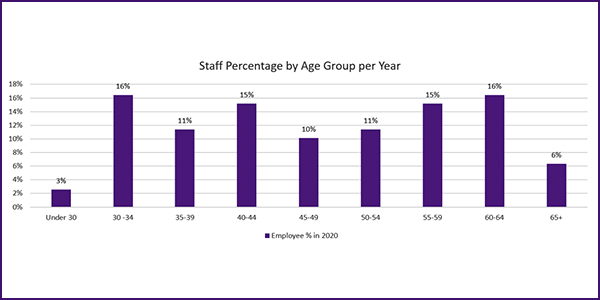ReliabilityFirst’s annual meeting, held via conference call on Thursday, saw presentations to the regional entity’s membership and Board of Directors on topics ranging from diversity in hiring to next year’s financial metrics.
Board Confirms RF Leadership
The board unanimously reconfirmed RF’s leadership for another year, including President and CEO Tim Gallagher; Vice President of Reliability and Risk Jeff Craigo; Vice President of Entity Engagement and Corporate Services Robert Eckenrod; General Counsel and Corporate Secretary Niki Schaefer; and Treasurer Carol Baskey.
Directors also approved the board meeting schedule for next year, with meetings to be held March 18, June 16-17, Aug. 18-19 and Dec. 1-2. All meetings are currently planned to be held in person, though the board reserved the option to convert to conference calls as needed.
More Diversity Investments Needed
Wendy Weaver, manager of human resources, told the board that the organization’s efforts to create a more diverse workforce are showing signs of success, though much work is still needed.

ReliabilityFirst’s staff in 2020 broken down by age group (top) and gender (bottom) | ReliabilityFirst
Consistent gaps are still present in terms of both ethnicity and gender, with RF’s staff 93% white and 69% male. Weaver reminded the board that the gender division has improved slightly from this time last year — when the split was 29% female to 71% male — and that an equal number of men and women were hired this year. But she said it can do more to ensure that talented women apply to the organization.
Similarly, ethnic diversity remains a “major gap” that the HR department is working hard to overcome. Initiatives to address the shortfall include partnerships with advocacy groups such as the National Society of Black Engineers and the Society of Women Engineers, and outreach to historically black colleges and universities.
The coronavirus pandemic has also provided an unexpected opportunity to expand the RE’s outreach, thanks to the expansion of remote work opportunities and the revelation that many jobs do not actually require an employee’s full-time physical presence. Candidates that may not have seen RF as an attractive proposition may now be tempted to give the organization a second look, while the organization’s recruiters similarly have a new motivation to cast a wider net.
The pandemic “has changed the landscape of recruiting this year and into the future — everything from virtual recruiting, virtual onboarding, virtual job fairs,” Weaver said. “But it’s also created a really great opportunity for us to look at different offerings and try on different vendors.”
COVID Frees Funds for Assessment Relief
RF is on course to end the year $1.1 million, or 4.54%, underbudget, members heard in a presentation from Baskey.

RF staff in 2020 by ethnicity | ReliabilityFirst
Savings mainly came in the areas of employee benefits, contracts and consultants, and meeting and travel expenses, the last of which came as an unexpected result of the COVID-19 pandemic. It also enabled savings in the other two categories, Baskey reported, thanks to the deferral of training programs that the RE counts as employee benefits and the postponement of some contracts and consulting agreements until next year.
Similar trends were seen across the ERO Enterprise this year, with NERC in August projecting it would end the year $2.4 million underbudget for meetings and travel. (See Pandemic Provides Travel Savings for NERC, REs.)
RF’s budget for next year, approved by FERC Approves Standard Revisions, ERO Budgets.) Baskey explained that the lower assessment reflects that the RE plans on “really giving back our savings from COVID” next year.
Elections and Departures

Members elected Rachel Snead, director of NERC reliability compliance and policy for Dominion Energy Virginia, to the board as the new representative from the supplier sector. Re-elected were Scott Etnoyer, senior director of Talen Energy’s NERC and cyber protection program, representing the at-large sector, and independent member Patrick Cass, former executive in residence at the University of Louisville College of Business.
Snead will take the place of Lou Oberski, formerly of Dominion Resources Services, who served on RF’s board since 2011 including stints as chair and vice chair. The board passed a resolution thanking Oberski for his service, as well as fellow retiring Directors Lisa Barton, of American Electric Power, and Susan Sosbe, of Wabash Valley Power Association. Barton has served on the board since 2014 and Sosbe since 2017.
“You guys are great leaders across the industry, and RF is really an example of incredible leadership,” Barton said at the close of the board meeting. “My parting words are … keep it up; keep RF in the lead. It really has been at the cutting edge of governance for all of the regional entities.”




